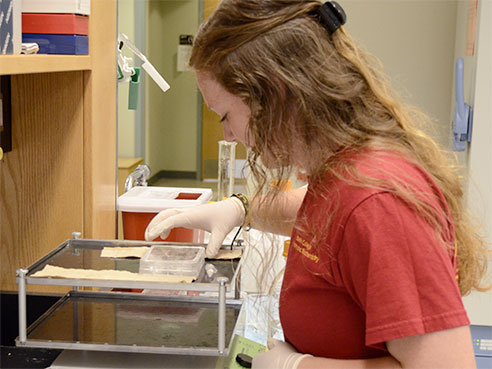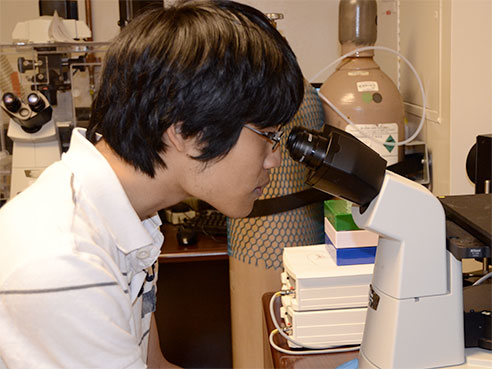 Krista Hoevemeyer, class of 2013, at a lab bench. UAB's SPIN program fosters career development for underrepresented minority college students and/or students from non-research-intensive universities.The University of Alabama at Birmingham Summer Program in Neuroscience, a program designed to promote careers in science to deserving undergraduate college students, has regained funding from the National Science Foundation. The new grant, $120,000 per year for three years, will allow for significant expansion of the program, which aims to foster career development and provide research training for underrepresented minority students and/or students from non-research-intensive universities.
Krista Hoevemeyer, class of 2013, at a lab bench. UAB's SPIN program fosters career development for underrepresented minority college students and/or students from non-research-intensive universities.The University of Alabama at Birmingham Summer Program in Neuroscience, a program designed to promote careers in science to deserving undergraduate college students, has regained funding from the National Science Foundation. The new grant, $120,000 per year for three years, will allow for significant expansion of the program, which aims to foster career development and provide research training for underrepresented minority students and/or students from non-research-intensive universities.
“The SPIN program focuses on students with demonstrated scientific aptitude who have interest in pursuing a career in scientific research but have not been exposed to that environment,” said Gwendalyn King, Ph.D., assistant professor in the Department of Neurobiology and the SPIN program director. “SPIN is a 10-week research-intensive program in which students are mentored in UAB neuroscience labs to get a firsthand look at whether research is a good career option for them.”
The program enrolls 10 students each summer, usually juniors and seniors, who get hands-on experience in a laboratory, as well as career counseling. Students are paired with a UAB neuroscience faculty member and are also mentored by senior graduate students in the lab.
“The program is a real opportunity for learning what a career in science is all about,” said Lucas Pozzo-Miller, Ph.D., professor of neurobiology and SPIN co-director. “They don’t sit and watch — they are actively involved in the lab’s work. The goal of the program is that students accomplish enough to qualify for co-author status on research papers that originate in the lab.”
SPIN was originally funded by NSF for three years beginning in 2005. Following a loss of external funding in 2008, the program continued on a reduced scale through generous contributions from UAB internal organizations, including the Department of Neurobiology, the Comprehensive Neuroscience Center, the Civitan International Research Center and the Office of the Provost.
 SPIN participants such as Jinwoo Hur, class of 2013, spend ten weeks in UAB neuroscience research labs.The reinstatement of NSF funding will allow the program to expand the number of students enrolled, provide stipends and help cover the cost of housing and meals. Since inception in 2005, SPIN has trained 106 undergraduates hailing from 29 states and two foreign countries.
SPIN participants such as Jinwoo Hur, class of 2013, spend ten weeks in UAB neuroscience research labs.The reinstatement of NSF funding will allow the program to expand the number of students enrolled, provide stipends and help cover the cost of housing and meals. Since inception in 2005, SPIN has trained 106 undergraduates hailing from 29 states and two foreign countries.
Several former participants are now graduate students at UAB.
“I went to a small, liberal arts university in Minnesota for my undergraduate degree where there was little opportunity for doing research,” said Angie Nietz, now a fifth-year graduate student in the lab of Jacques Wadiche, Ph.D., associate professor of neurobiology. “The program gave me one of my only experiences of what it is like to do research outside of a classroom setting before entering graduate school. The research experience and excellent mentorship I received prepared me for applying to and being successful in graduate school.”
Nancy Gallus did her undergraduate work in molecular medicine at the University of Tübingen, Germany, before attending the UAB Spin program. She is now a graduate student in the laboratory of Jeremy Day, Ph.D., assistant professor of neurobiology.
“SPIN was very important for me, as it was one of my first real research experiences,” she said. “It also helped me decide where I wanted to go for graduate school and how to apply.”
Shelly Nason, now a second-year graduate student in the lab of Kirk Habegger, Ph.D., assistant professor, Department of Medicine, says her Michigan liberal arts college did not offer opportunities for neuroscience research.
“SPIN was most beneficial to me in professional development, beyond the benefits of understanding what it meant to participate in actual research,” she said. “I entered the program feeling less than confident in my ability to get into graduate school, and I left with the tools and confidence that helped me receive multiple acceptance letters. I highlight the SPIN program as the best opportunity in my undergraduate studies that propelled me forward in my career as a scientist.”
Pozzo-Miller says the program has benefit even for those attendees who ultimately decide against a career in science.
“These are people who will have a voice in the future of science,” he said. “They are voters, decision-makers and potential leaders of our country, and it is incumbent on us to teach them critical thinking skills, to help them understand the importance of scientific thought, and to understand and believe in the value of science.”
“Diversity in science is extremely important, as it is in all fields,” King said. “We need investigators with different backgrounds and different experiences. This program, we hope, will foster and instill a love of science in these students.”
The deadline for applying for a position in the 2017 SPIN program in March 1. Information on applying is available online. The program runs from June 5 to Aug. 11.